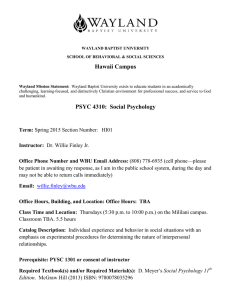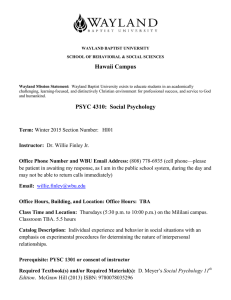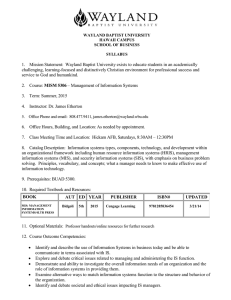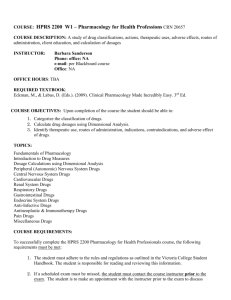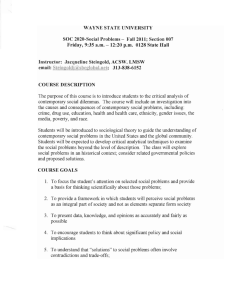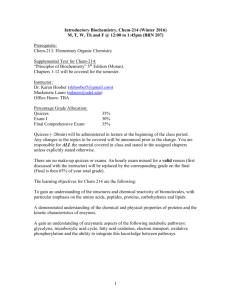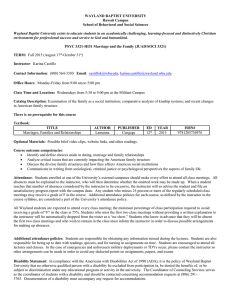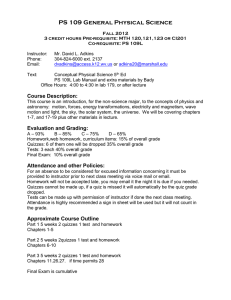Wayland Baptist University Hawaii Campus School of Behavioral and Social Sciences
advertisement
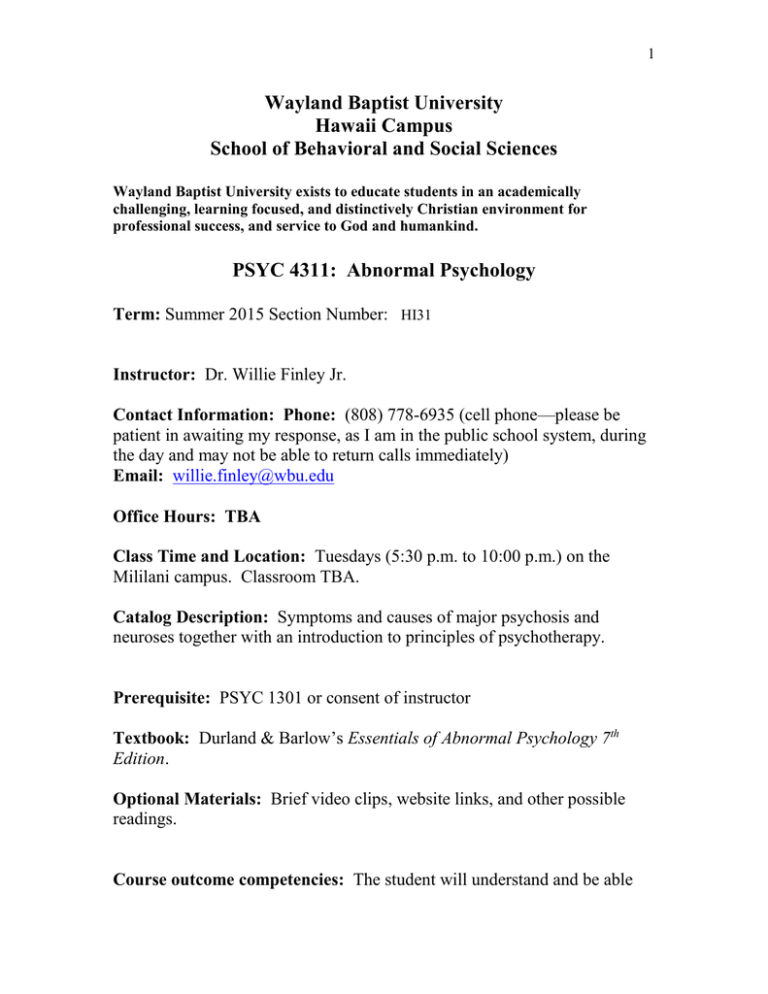
1 Wayland Baptist University Hawaii Campus School of Behavioral and Social Sciences Wayland Baptist University exists to educate students in an academically challenging, learning focused, and distinctively Christian environment for professional success, and service to God and humankind. PSYC 4311: Abnormal Psychology Term: Summer 2015 Section Number: HI31 Instructor: Dr. Willie Finley Jr. Contact Information: Phone: (808) 778-6935 (cell phone—please be patient in awaiting my response, as I am in the public school system, during the day and may not be able to return calls immediately) Email: willie.finley@wbu.edu Office Hours: TBA Class Time and Location: Tuesdays (5:30 p.m. to 10:00 p.m.) on the Mililani campus. Classroom TBA. Catalog Description: Symptoms and causes of major psychosis and neuroses together with an introduction to principles of psychotherapy. Prerequisite: PSYC 1301 or consent of instructor Textbook: Durland & Barlow’s Essentials of Abnormal Psychology 7th Edition. Optional Materials: Brief video clips, website links, and other possible readings. Course outcome competencies: The student will understand and be able 2 to: 1. Possess an adequate understanding of all major disorders listed in the DSM-IV as evidenced through major exams. 2. Use diagnostic resources to recognize and diagnose symptoms of all major disorders. 3. Orally discuss in a presentation format the historical development of abnormal psychology and treatments from both the past and the present. 4. Using APA style, describe in written form the various legal and ethical issues involved in the diagnosis of mental illness. Attendance: Students enrolled at one of the University’s external campuses should make every effort to attend all class meetings. All absences must be explained to the instructor—who will then determine whether the omitted work may be made up. When a student reaches a number of absences deemed excessive by the instructor, the instructor will advise the student and file an unsatisfactory progress report with the campus dean. Any student who misses 25% or more of the regularly-scheduled class meetings will receive a grade of ‘F’ in the course. Additional attendance policies for each course, as defined by the instructor in the course syllabus, are considered a part of the University’s attendance policy. Additional Attendance Policies: Students are responsible for obtaining any information missed during the lectures. Students are also responsible for being up-to-date with readings and quizzes and for turning in assignments on time. , due to limited class time, students are encouraged to attend all lectures. Services for the Disabled: In compliance with the Americans with Disabilities Act of 1990 (ADA), it is policy of Wayland Baptist University that no otherwise qualified person with a disability be excluded from participation in, be denied the benefits of, or be subject to discrimination under any educational program or activity in the university. The Coordinator or Counseling Services serves as the coordinator of students with a disability and should be contacted concerning accommodation requests at: (806) 291-3765. Documentation of a disability must accompany and request for accommodations. 3 Course Requirements: Students are expected to attend all class sessions; since meeting times are held only once a week, vast material will be covered. If a student is absent—excused or unexcused—it is his/her responsibility to get notes from another classmate. Again, because of the scarcity in meeting times, it is the student’s responsibility to stay on top of the readings. To ensure the student understands the barebones of the readings and lectures, small weekly quizzes will be given either at the end of class or, on some occasions, to be taken home and completed by the students. The quizzes are more application in nature and should not alarm the student, as they only serve as reminders of what he/she might need to further study. Make-ups will not be issued without a valid excuse. Students have the option of writing or typing quiz responses—but in all cases, handwriting needs to be legible. Later in the semester, the student will write a 5 to 10 page paper on a psychological disorder and treatment plan. The student will choose a character from a novel, comic strip, movie, child’s toy, soap opera, mythology, etc., etc.! An example might be Gollum/Smeagol in The Lord of the Rings series. The student will give a brief background on the character, describe the character’s diagnosis and why, and finally come up with a treatment plan that might help the character. Though the paper is meant to be inspiring and fun, it MUST adhere to APA format. References must be included—especially when coming up with a treatment plan and explaining what led one to come up with the diagnosis. Lastly, there will be three tests issued over the course of the semester. The student is encouraged to participate in discussions, take notes (if need be), and be punctual. Method of determining course grade: As stated above, the bulk of the course will consist of three exams, a short paper, quizzes, and regular attendance/participation. The University has a standard grade scale: A= 90-100, B=80-89, C=70-79, D=60-69, F=below 60, W=Withdrawal, WP=Withdrew passing, WF=Withdrew failing, I=Incomplete. An incomplete may be given within the last two weeks of a long term or within the last two days of a microterm to a student who is passing but has not completed a term paper, examination, or other required work—for reasons beyond the student’s control. A grade of “Incomplete” is changed if the 4 work required is completed prior to the last day of the next long (10 to 15 weeks) term, unless the instructor designates an earlier date for completion. If the work is not completed by the appropriate date, the ‘I’ will be converted to an ‘F.’ Instructor’s Policy on Academic Dishonesty: All tests, papers, quizzes, et cetera should solely be the work of the student. While group studying is encouraged, sharing work will not be tolerated. Furthermore, there will be zero tolerance for plagiarism. Depending on the severity, using another’s ideas as one’s own could result in a rewrite, zero, and/or referral to the dean. To avoid the risk of stealing another’s ideas, all works should be cited using APA formatting (and this includes paraphrasing). All written assignments will require a reference page. Appealing Grades: Students s hall have protection through orderly procedures a g a i n s t p r e j u d i c e s o r c a p r i c i o u s academic evaluation. A student who believes that he or she has not been held to realistic academic standards, just evaluation procedures or appropriate grading, may appeal the final grade given in the course by using the student grade appeal process described in the Academic Catalog. Appeals may not be made for advanced placement examinations or course bypass examinations. Appeals are limited to the final course grade, which may be upheld, raised, or lowered at any stage of the appeal process. Any recommendation to lower a course grade must be submitted through the Executive Vice President/Provost to the Faculty Assembly Grade Appeals Committee for review and approval. The Faculty Assembly Grade Appeals Committee may instruct that the course grade be upheld, raised, or lowered to a more proper evaluation. 5 Tentative Schedule (subject to change!): Week 1 (5/24): Orientation; Chapters 1 and 2 Week 2 (5/31): Chapters 1 and 2 Continued; Quiz 1; Chapters 2 and 3/Review Week 3 (6/7): Exam 1 Week 4 (6/14): Chapters 4 and 5 (Quiz 2) Week 5 (6/21): Chapters 5 and 6 Week 6 (6/28): Chapters 5 and 6 (Quiz 3)/Review Week 7 (7/5): Exam II Week 8 (7/12): Chapters 7 and 8; Quiz 4; Papers Due Week 9 (7/19): Chapters 11 and 12; Quiz 5 Week 10 (7/26): 13 and 14; Review (Tie-up any loose ends) Week 11 (8/3): Exam III Additional Information: Important Notes: Again, be aware that this is a tentative schedule. If the class needs to spend more time on an interesting topic, adjustments may be made. Also please be sure to read any and all announcements on the quizzes. All of your grades will be recorded and updated on your note cards—thus, please ensure your note cards are turned in by the end of class. The method of grade determination will be via the following point system: Class Participation: 50 pts Attendance: 100 pts Quizzes (20 pts a piece): 100 pts Exams (3 total): 450 pts Paper: 300 pts As a result, here is the class grading scale (mirroring the University’s): 900-1000= A 800-899=B 700-799=C 600-699=D 599-Below=F 6
